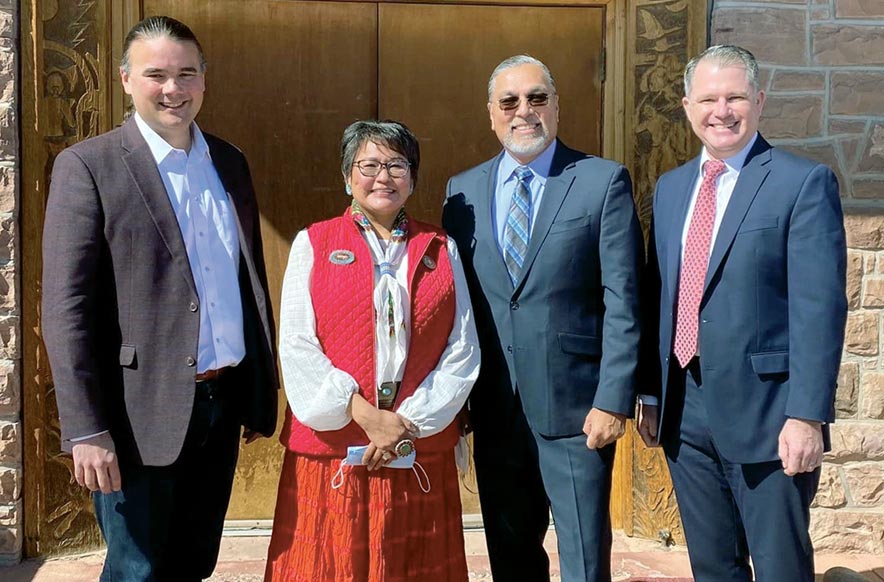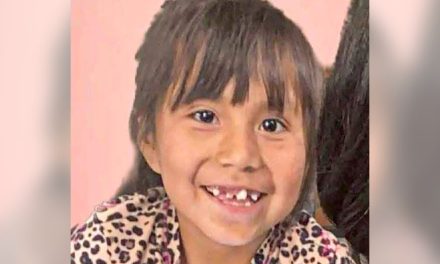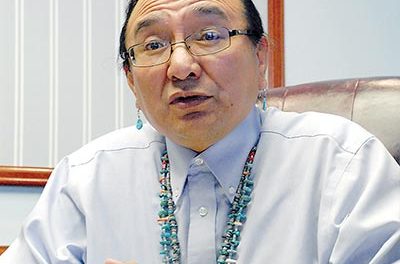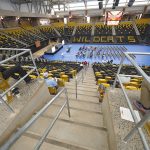
Asst. secretary says Interior will help tribes spend federal money

Courtesy photo | Eugenia Charles Newton Left to right, Bryan Newland, assistant secretary for Indian affairs for the U.S. Department of Interior, Delegate Eugenia Charles Newton, Bart Stevens, Bureau of Indian Affairs deputy director for field operations, and Gregory Mehojah, director of the BIA Navajo Regional Office, stand in front of the Council Chamber in Window Rock on Feb. 24.
WINDOW ROCK
Last week, Bryan Newland, assistant secretary for Indian affairs for the U.S. Department of the Interior, made a trip to the Navajo Nation to hear from delegates about their priorities in a Naabik’iyati Committee roundtable discussion.
Newland was joined by Bart Stevens, Bureau of Indian Affairs deputy director for field operations, and Gregory Mehojah, director of the BIA Navajo Regional Office.
Each delegate had up to three minutes to speak about the needs in their communities, including transportation infrastructure, public safety facilities, health care, education, broadband and economic development.
Newland is a member of the Bay Mills Indian Community (Ojibwe), where he served a tribal president and, prior to that, chief judge of the Bay Mills Tribal Court.
Newland said that one of his priorities is to help the Navajo Nation cut red tape and spend funds through the bipartisan Infrastructure Investment and Jobs Act, which includes $550 billion for roads and bridges, water infrastructure, rail systems, climate resilience, internet, and more.
According to the speaker’s office, over his four-day trip to New Mexico and Arizona, Newland met with leaders of the Hopi Tribe, Gila River Indian Community, Ak-Chin Indian Community, Havasupai Tribe, Hualapai Tribe, and the All Pueblo Council of Governors.
“Our work has to be about the people in our tribal communities to make their lives a little bit better with the time that we have,” said Newland.
‘Hear them out’
Delegate Rickie Nez, chairman of the Resources and Development Committee, said with 500 abandoned uranium sites on the Navajo Nation it is critical that the U.S. EPA expedite the cleanup of their toxic legacy.
“It is very dangerous,” said Nez. “It has caused health problems for our dear Navajo people.”
Nez also emphasized the dire need for funding for roads and bridges across the Navajo Nation, which was echoed by several other delegates.
“Roads and bridges are the lifeline for connecting our urban and rural areas across the Navajo Nation, especially for schools, businesses, and front-line workers,” said Delegate Daniel Tso, chairman of the Health, Education and Human Services Committee.
Tso requested that “federally established historical roads” that were grader-bladed by the BIA as early as the 1970s should not have to go through the rights-of-way and archaeological and fish-and-wildlife clearance process.
“They should be grandfathered in,” he said.
Nez also advocated for Chaco Canyon area land allottees who wish to be heard regarding the oil-and-gas drilling buffer zone.
“Our Navajo people, the allottees that live surrounding Chaco, have been asking from the bottom of their hearts to be listened to by the leadership of Washington,” said Nez.
“These monies that they get supports their families, their children,” he said. “They have not been heard and there needs to be a public hearing at Nageezi Chapter.”
In 2019 the Naabik’íyátí’ Committee voted to support a five-mile buffer zone around Chaco Canyon that allows allottees to advance development. But last November, the Biden administration announced a 20-year ban on oil-and-gas drilling within a 10-mile radius of the Chaco Culture Heritage Park.
Following the announcement from Interior, President Jonathan Nez sent a letter to President Joe Biden reaffirming the Navajo Nation’s position in favor of a five-mile buffer zone.
Delegate Mark Freeland said thousands of Navajo families with allotments that he represents will be severely impacted by a 10-mile buffer zone.
He emphasized that Chaco Canyon is within the boundaries of the sovereign Navajo Nation and requested DOI Secretary Debra Haaland visit the area and hear from the people directly impacted.
“We really need the secretary to hear them out,” said Freeland. “That announcement was really a shock. This is not an issue about oil and gas. This is an issue for our Navajo people who deserve to be heard.”
Freeland also said the Nation needs assistance with the demolition of crumbling, old, abandoned buildings that are a public safety hazard on the Navajo Nation, which other delegates requested as well.
Delegate Eugenia Charles-Newton, chair of the Law and Order Committee, who chaired the Naabik’iyati’ meeting as pro-tem speaker, asked Newland to help replace public safety buildings on the Navajo Nation, including the Shiprock and Window Rock police stations that were shut down completely in 2020 and 2018, respectively.
“Both police stations serviced large populations,” she said.
Both are also on the BIA Replacement Facility List.
“Navajo law enforcement and emergency medical personnel are impacted by this pandemic tremendously and how they properly respond to the needs of our communities,” said Charles Newton. “It should not take our public safety workers hours and traveling hundreds of miles a day just to do their jobs.”
She also suggested that the BIA needs to set aside funds for the operation and maintenance of public safety buildings and several smaller substations and additional fire departments need to be built in rural communities.
‘You took our land’
Delegate Otto Tso, chairman of the Navajo-Hopi Land Commission, said the U.S. must move forward on its obligations through the Navajo-Hopi Relocation Program, including rehabilitation efforts in Navajo Partitioned Lands and former Bennett Freeze area.
When the freeze was lifted in 2009, no plans were made to rehabilitate the region, he said.
“These two areas have been greatly impacted by economic, social and community development halting,” said Tso. “Our federal government at this time needs to live up to its trust responsibilities and its need to provide services on the Nation that they conquered.
“You took our land,” said Tso. “You took our natural resources, our waters. We just want our fair share so that the trust responsibility can continue to move forth.”
Delegate Raymond Smith said that while it is good news that the Indian Health Service’s Sanitation Deficit System projects are now fully funded with more than $700 million, assistance is needed to complete the projects.
“We don’t have enough contractors, we don’t have enough staff to get these things done in a timely fashion,” he said.
Delegate Eugene Tso said that new population surveys need to be conducted to make sure public safety and health-care service areas are properly funded and community needs are being met based on accurate counts.
With only a few minutes left to respond before his departure, Newland said that the inadequate condition of law enforcement facilities for tribes is widespread.
“This is a priority that I hear consistently in my travels across Indian Country from tribal leaders is that we need more investments in public safety,” he said. “That includes officers, jails, courts, wellness and prevention programming to prevent crime in the first place.”
Newland said these critical needs are being taken into account in the Biden administration’s FY22 budget request.
“This is something we continue to be invested in,” he said. “We want to make sure to put money where our mouth is when it comes to public safety.”
Newland said the need for roads, water and to have abandoned buildings fixed is also prevalent.
“That’s another area where the president’s administration is starting to make investments,” he said. “Indian Country has a long way to go to catch up to the rest of the country on things like that.”
He said under the American Rescue Plan Act and the bipartisan infrastructure law, the U.S. has made an historic $45 billion investment in Indian Country in a single year.
“One of the things we’re trying to do in the Department of Interior and Bureau of Indian Affairs is make sure that you all are spending those funds right away,” said Newland.
He agreed that leasing approvals and clearance processes should not take years and years holding up important work.
Responding to Otto Tso, Newland said the Office of Navajo and Hopi Indian Relocation was “on his radar.”
“It’s in litigation right now so there’s not a lot I can share with you today, but I do know our department and the administration have committed to those conversations,” he said.
Regarding the Chaco Canyon buffer zone, Newland said he’s hearing the message loud and clear and the DOI is planning to move forward with public meetings with allocatees so the people can be heard.







 Highway 264,
Highway 264, I-40, WB @ Winslow
I-40, WB @ Winslow